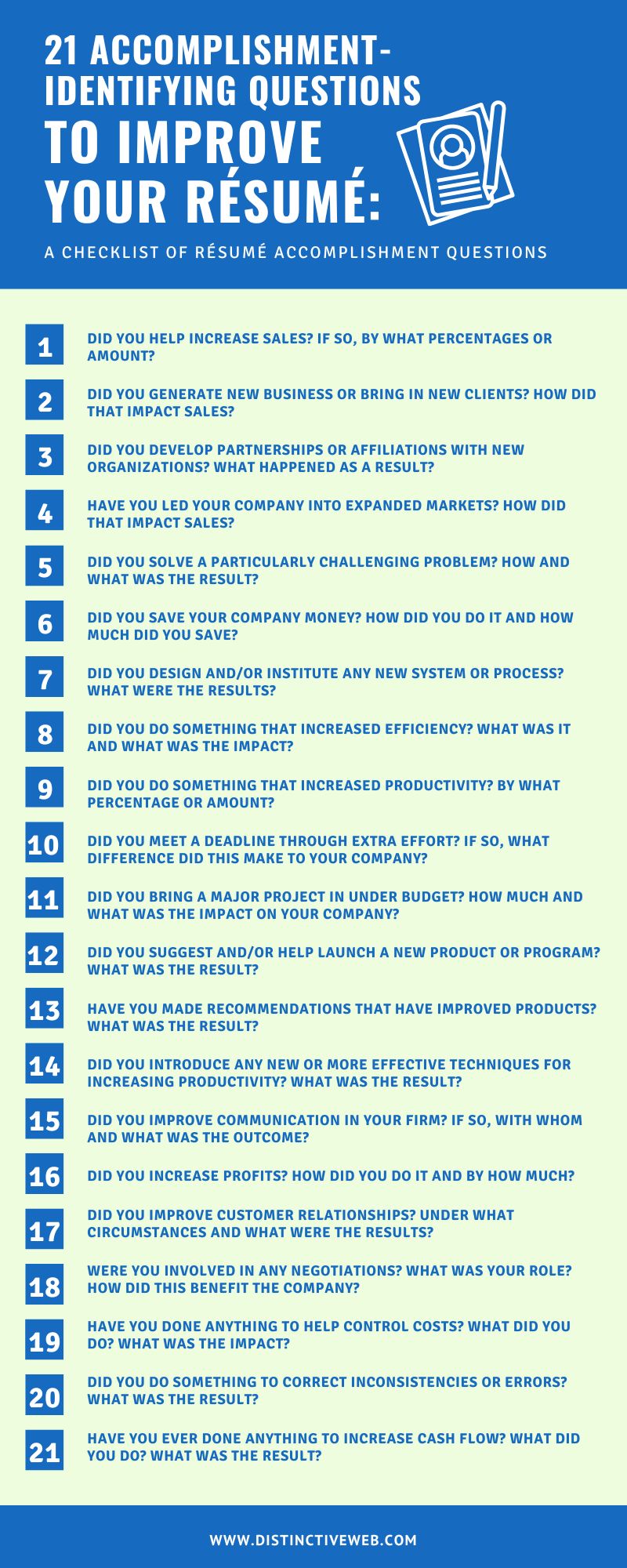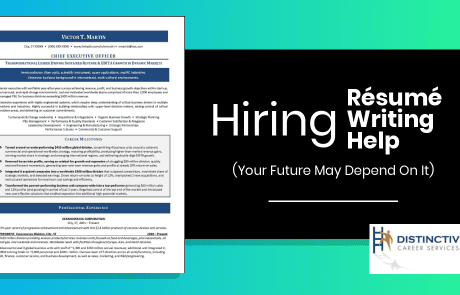
Fill your resume with examples of your accomplishments and turn it from a summary of your job history into a compelling narrative of your professional achievements. This is resume advice that you have likely heard many times. But for many job seekers, perhaps you among them, that is easier said than done.
It is often hard to remember work accomplishments from past positions. Even if your memory is fresh, identifying your accomplishments to list on your resume requires thinking about your work in a different way.
But more than that, when you’re writing your resume job descriptions, it can be tempting to focus on listing out your job duties in each position you’ve held.
After all, potential employers want a description of your previous jobs, right?
Wrong.
What potential employers really want to see is the results you achieved in each role. In other words, they want to see your professional accomplishments and how these past achievements benefited your employers.
Why is this important? Simple. Accomplishments on your resume do more than list your responsibilities; they showcase your unique contributions, problem-solving skills, and the value you bring to an organization.
TABLE OF CONTENTS:
- 120+ Impactful Resume Accomplishments: How To Identify & Articulate Them
- Accomplishments on Your Resume Showcase Results
- Resume Accomplishments Demonstrate Soft Skills
- Resume Accomplishments Tell the Story of Your Career Journey
- Accomplishments on Your Resume Paint a Picture of Who You Are as an Employee
- How To Identify Your Relevant Accomplishments for Your Resume
- Boosting Sales & Revenue: Questions & Accomplishment Examples
- Improving Efficiency & Productivity: Questions & Accomplishment Examples
- Leadership & Team Management: Questions & Accomplishment Examples
- Cost Savings & Financial Management: Questions & Accomplishment Examples
- Customer Relations & Service Excellence: Questions & Accomplishment Examples
- Innovation & Problem-Solving: Questions & Accomplishment Examples
- Communication & Interpersonal Skills: Questions & Accomplishment Examples
- Overcoming Challenges & Crisis Management: Questions & Accomplishment Examples
- For Blue-Collar Professions: Questions & Accomplishment Examples
- Miscellaneous: Questions & Accomplishment Examples
- What Is the Best Way to Include Examples of Accomplishments on a Resume?
- Conclusion
Accomplishments on Your Resume Showcase Results
Listing job duties and responsibilities only tells the reader of your resume what you were supposed to do. They don’t provide hiring managers with any understanding of what you DID do.
Not to mention, everyone else who has held a similar job as you have probably had almost the same day-to-day responsibilities. Listing these job responsibilities in the work experience section of your resume just makes you average. To stand out in your job search and win not just interviews but job offers, you have to go beyond this.
When you fill your resume with professional accomplishments and achievements, you are not only showing what you are capable of, but you are also demonstrating that you get results.
This is important because every hiring manager wants to hire people who will be an asset to their company, deliver value, and help them achieve their goals.
By including relevant accomplishments in your resume, you are sending the message to the hiring manager that you are such a person.
Resume Accomplishments Demonstrate Soft Skills
In addition to highlighting hard skills on your resume, it’s also important to demonstrate transferable soft skills such as teamwork, leadership, and communication.
Your resume accomplishments can be a great way to do this.
For example, if you led a team to success on a major project, that shows that you have strong leadership skills. Or if you increased efficiency by streamlining a process, that indicates that you’re good at problem-solving and finding creative solutions.
Resume Accomplishments Tell the Story of Your Career Journey
The perfect resume is more than just a list of where you’ve worked and for how long. The best resumes tell the story of your career journey, the challenges you’ve faced, how you’ve met those challenges, and how these actions you have taken produced positive results (this is called the C.A.R. technique of resume writing).
By zeroing in on your successes, you can stand out from other job seekers and give hiring managers a better sense of how you add value and what kind of employee you are.
Reading about your professional accomplishments in the context of your career journey also helps each hiring manager to make the connections between the challenges they are facing and the ways you have delivered value when faced with these same challenges in the past.
Stories of your career journey make you memorable and give the achievements on your resume meaningful depth and context.
Accomplishments on Your Resume Paint a Picture of Who You Are as an Employee
Your resume should give hiring managers a sense of who you are as an employee and what kind of contributions you would make to their company.
Resume accomplishments are the way to do this.
- Are you a creative problem solver?
- Do you have a knack for developing strong relationships with clients or customers?
- Do you have a track record of going above and beyond in your roles?
Answering these accomplishments questions can help set you apart from other candidates and give employers a better sense of whether or not you would be a good fit for their organization.
Accomplishments on your resume provide hard evidence of the results you achieved in past roles. Hiring managers want to see that you have a history of getting things done and making an impact in your previous roles.
Bonus tip: To really make your resume stand out quantify your accomplishments. In other words, use dollar figures, whole numbers, or percentages to describe the results of your achievements whenever possible.
How To Identify Your Relevant Accomplishments for Your Resume
Now that you know how important it is to include accomplishments on a resume, you’ll want to go back to your own resume and strengthen each job description in your resume work history with your accomplishments.
The following 120 resume accomplishment questions will help. Not every question will apply to you, but those that do will help you develop a list of accomplishments that you can use to rewrite, reinforce, and improve your resume. For each question, we provide an example of how to turn that accomplishment into an effective bullet point on your resume.
Filling your resume with accomplishment examples and the measurable results you reproduced will make a dramatic difference in your resume results.
Let’s get started!
Boosting Sales & Revenue: Questions & Accomplishment Examples
Improving Efficiency & Productivity: Questions & Accomplishment Examples
Leadership & Team Management: Questions & Accomplishment Examples
Cost Savings & Financial Management: Questions & Accomplishment Examples
Customer Relations & Service Excellence: Questions & Accomplishment Examples
Overcoming Challenges & Crisis Management: Questions & Accomplishment Examples
What Is the Best Way to Include Examples of Accomplishments on a Resume?
Just listing accomplishments on a resume without the context and story around them won’t be very effective.
To really improve and fix your resume you will want to transform the accomplishments you have uncovered into compelling text. If you are struggling with this, working with a professional resume writer can help.
Not only do professional resume writers help with identifying accomplishment examples for resumes, but they will also take your generic list of accomplishments and transform them into compelling and persuasive stories that speak to the needs of each hiring manager.
The expert writing team at Distinctive Career Services is ready to support you in identifying your accomplishment examples and crafting a standout, modern resume. We invite you to schedule a free resume-writing consultation to learn more.
Conclusion
By simply thinking about your experience and achievements in this way–digging deep to find the numbers and benefits of your work–you are heads and shoulders above most of your competition in the job market.
But now that you have identified your achievements, use them to fix your resume and improve your job search results.
Among other important resume writing tips, when crafting your resume, remember to focus on your accomplishments rather than simply listing job duties. This will give hiring managers a better sense of the type of employee you are and whether you’d be a good fit for their organization.
With so many qualified candidates out there, it’s important to make your resume stand out – and highlighting your successes is one essential way to do that!










